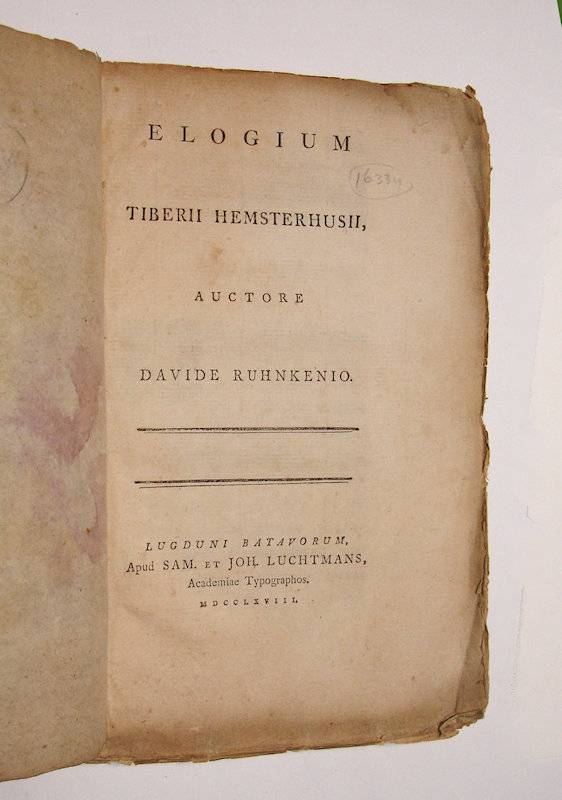HEMSTERHUIS,T.- RUHNKEN,D.
Elogium Tiberii Hemsterhusii auctore Davide Ruhnkenio.
Leiden (Lugduni Batavorum), Apud Sam. et Joh. Luchtmans, Academiae Typographos, 1768.
8vo. 60,(4 blank) p. Contemporary paper wrappers 22 cm (
Ref: STCN ppn 240927982) (
Details: First edition. Margins uncut) (
Condition: Cover worn. Right edge thumbed and slightly chipping. Paper yellowing) (
Note: The honour of reviving the study of Greek in the Netherlands belongs to the Dutch classical scholar Tiberius Hemsterhuis, 1685-1766, who was appointed professor Mathematics and Philosophy at the Athenaeum of Amsterdam at the age of 19. His great example was the English classical scholar Richard Bentley, 1662-1742, Master of Trinity College, Cambridge, with whom he corresponded early in his career. In 1705 Hemsterhuis was promoted to a professorship in Harderwijk, and in 1717 he was appointed professor of Greek at the University of Franeker. In 1740 he was finally called to Leiden. He produced an edition of Pollux (1706), 'Luciani colloquia et Timon' (1708), the complete works of Lucianus (1743) and of the Plutus of Aristophanes (1744), a work which Gudeman calls 'epochemachend'. He contributed also notes to the editions of many other scholars. Sandys observes that 'the work of a Hemsterhuis was worth whole bundles of the mechanically manufactured products of a Burman'. (Sandys 2,451) Hemsterhuis was the founder of a Dutch school of criticism, the so-called 'Schola Hemsterhusiana', which had disciples in Valckenaer, Jacob van Lennep and David Ruhnken. The last one was the most famous of his pupils. 'Hemsterhuis has had the supreme felicity of being immortalised by a 'laudator eloquentissimus'. The 'Elogium' delivered in 1768 by his devoted pupil Ruhnken, on resigning the office of Rector, is one of the Classics in the History of Scholarship. It presents us with the living picture of the perfect critic'. (Idem, ibidem)
§ The Dutch scholar of German origin David Ruhnken, or Ruhnkenius, 1723-1798, was born in Pommern, and was sent by his parents in 1737 to the Friedrichscollegium in Königsberg, where he read Latin authors together with his friend Immanuel Kant. To finish his studies he went in 1744 to Leiden, to study Greek under Tiberius Hemsterhuis, whom he admired. He later told his biographer Wyttenbach that he found in his teacher the combined gems of Leiden classical scholarship, Scaliger and Salmasius, in one person. Hemsterhuis wanted to create a worthy successor, and appointed him in 1757 to assist him as Reader in Greek. In 1761 Ruhnken succeeded the Latin chair vacated by Oudendorp. He became one of the leading scholars of his days. 'Die Führerstellung der Philologie erbte (...) von Hemsterhuys der Pommer David Ruhnken, der ganz zum Holländer ward und die vornehme und behäbige Würde eines 'Princeps criticorum' zu wahren wusste. Als solchem hat ihm Fr.A. Wolf die Prolegomena gewidmet. (...) Musterhaftes Latein galt ihm soviel wie Wissenschaft. Aber als Lehrer muss er glänzend gewesen sein. (...) Alles was Ruhnken veröffentlicht hat, ist in seinen Grenzen tadellos'. (U. von Wilamowitz-Moellendorff, Geschichte der Philologie, Lpz./Bln. 1921, p. 39/40) (
Collation: A-D8 (leaf D7 & D8 blank)) (Photographs on request)
Book number: 130073 Euro 160.00
Keywords: (Oude Druk), (Rare Books), Dutch history, Geschichte der klassischen Philologie, Hemsterhuis, Ruhnken, Textkritik, catbiografie, history of classical scholarship, niederländische Geschichte, textual criticism
 HEMSTERHUIS,T. RUHNKEN,D.
HEMSTERHUIS,T. RUHNKEN,D.